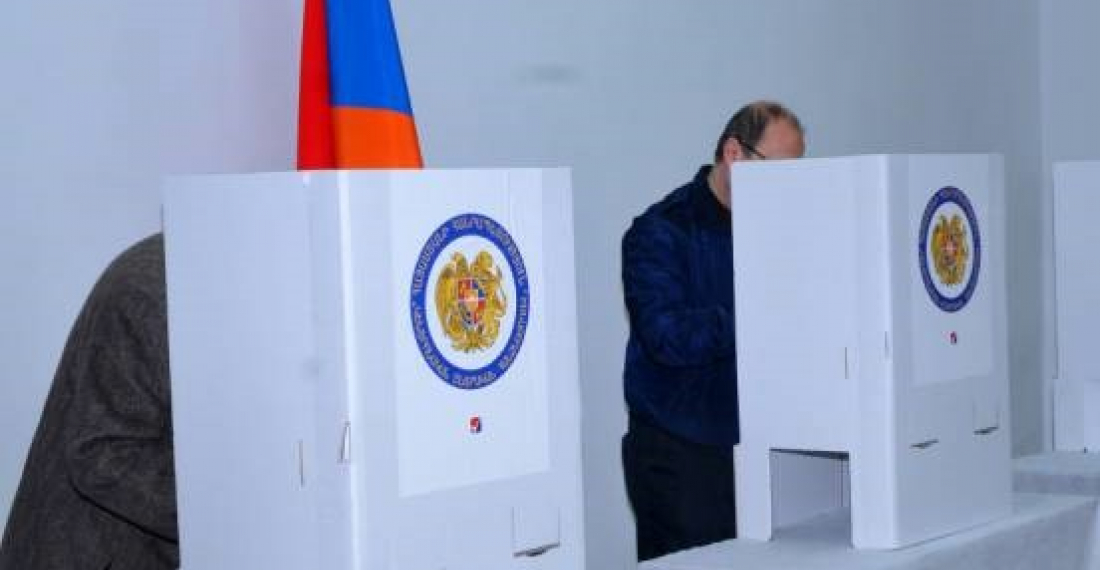The Russian media has taken a lot of interest in Sunday's parliamentary elections in Armenia. They echoed the Kremlin's position of advocating stability and discouraging street protests. But the newspaper Kommersant says many in Moscow were taken by surprise by the result.
Political strife in Armenia should move from the streets to the parliament, experts quizzed by Izvestia point out, commenting on the victory of Nikol Pashinyan’s party "Civil Contract" in the June 20 parliamentary election with 53.92% of the vote. The results do not give the opposition many chances to contest them, Izvestia reports. According to political analysts, Acting Prime Minister Pashinyan received a carte blanche from the nation, which has expressed a wish for change, but not for a change in government.
The majority of parties approved the election results, however, the Armenia and "I Have the Honor" blocs expressed doubt in their legitimacy. The Armenia bloc plans to contest the results in the Constitutional Court.
However, experts point out that Civil Contract’s victory was decisive, so it is unlikely that the vote will be contested in any serious way.
"We can talk about separate violations, but there is no doubt at all that Pashinyan won by a large margin. There was no ballot stuffing. There were other violations, but there weren’t any that could cause us to say that if not for that, Kocharyan [former Armenian president and head of the Armenia bloc] would have won. As for smear campaigns, unequal access to media, and so on, this should have been brought up before the vote. If this gets pointed out after some of the political forces did not like the results, this is not an argument for contesting the election," Armenian political scientist Hrant Mikaelyan told Izvestia.
He noted that the statements made by the Armenia bloc are more of a political than legal nature.
Meanwhile, Deputy Chairman of the State Duma Committee for CIS Affairs, Eurasian integration and Relations with Compatriots Viktor Vodolatsky, an observer at the Armenian election, told Izvestia that Russia is interested in Armenia’s return to stability.
"It is necessary that both those, who won, and those, who lost, find the courage to sit down at the negotiating table and for the sake of Armenia's development find compromises to resolve the issues that have accumulated," the Russian lawmaker said.
He added that it is important to consider the votes of those, who did not make it to the parliament, and invite representatives of those parties to act as experts in order to develop an action plan for the upcoming years. Otherwise, the country risks holding another snap election in the future, and "neither Armenia, nor Russia as its ally" would want that, the politician concluded.
The results of the elections in Armenia, which ended with the outright victory of Prime Minister Nikol Pashinyan and his "Civil Contract" party, came as a surprise to many in Moscow writes Maxim Yusin in the newspaper Kommersant.
These people were guided by false ratings and fake polls, which predicted success for the supporters of former President Robert Kocharyan. Now it is clear what the price of those inquiries were. In fact, it was part of the election campaign, and under the guise of sociologists, PR specialists were working, distorting the real picture unrecognizably.
It seems that the views of many of our compatriots on the situation in Armenia are also severely distorted. What was the picture like for a bystander who is not involved in internal Armenian affairs? Pashinyan is a lousy politician, the culprit and symbol of one of the most humiliating and shocking defeats in the history of Armenians. It is shocking against the background of the triumph, the rise of the national spirit, which existed after the victory of Armenia in the previous war with Azerbaijan in the 1990s. And here is such a crush on literally every article, with no chance. And the leader who pursued an irresponsible and reckless policy on the eve of the war, while provoking Baku and challenging Moscow, the only possible ally capable of preventing the conflict in its infancy, must logically answer for that. Pashinyan did everything so that the Kremlin does not have such a desire, and here is the catastrophic result.
But the paradox is that, as it turned out, the situation inside Armenia is different. These people are accused of corruption, dictatorial behavior, which the society is tired of.
The problem with the Armenian opposition is that it could not find new faces in the fight against Pashinyan. The society does not need those who were its symbols during the elections. That is why even Pashinyan is the least evil. Armenians are ready to forgive him for both defeat and humiliation. And this is the people's choice, no matter how illogical, ridiculous, masochistic it may seem.
The country's neighbors, both its partners and its enemies, will have to consider that choice. And one thing can be advised to the Armenian people - to get rid of illusions as soon as possible. Humiliation, concessions, compromises will not end. Maybe they are just beginning. This is the fate of all the states and peoples that lost the war. There are no exceptions, no miracles.
Sooner or later, Baku will have to make concessions both on border issues and on the transport corridor that will pass through Armenia, connecting Nakhichevan with the rest of Azerbaijan. These are the concessions that Pashinyan agreed to when concluding treaties on the cessation of hostilities. Unpleasant, disgusting, humiliating, but those provisions must be followed. And that is probably why the people who gave Pashinyan victory in the elections voted without realizing it.
source: commonspace.eu with Kommersant (Moscow) Izvestya (Moscow) and TASS (Moscow)






